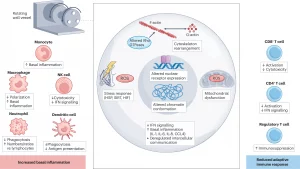As humanity prepares for a new era of space exploration, from commercial missions to potential colonies on the Moon and Mars, understanding how the human body responds to life beyond Earth has never been more critical. Among the systems most profoundly affected by spaceflight is the immune system, which protects against infection, cancer, and inflammation on Earth but behaves unpredictably in microgravity.
In a new study, researchers introduce the emerging field of astroimmunology. The study of how spaceflight and extraterrestrial environments influence immune function (Figure 1). The work defines the biological mechanisms underpinning immune dysfunction in space and provides a blueprint for maintaining astronaut health during long-duration missions.
Astronauts have long reported immune-related symptoms such as rashes, respiratory illness, and viral reactivation during and after missions, effects that intensify during prolonged exposure to microgravity. They therefore synthesised decades of data, integrating findings from International Space Station missions, the NASA Twins Study, and SpaceX Inspiration4, to map how immune regulation changes during spaceflight.
Their analysis highlights several interlinked stressors, including microgravity, cosmic radiation, circadian disruption, and psychological stress, that together reprogram immune cell behaviour. Multiomic analyses, which integrate genomics, proteomics, and metabolomics, reveal alterations in mitochondrial function, cellular metabolism, and inflammatory signalling that impair immunity and accelerate physiological aging.
This systems-level view offers a mechanistic explanation for why immune defences weaken in space and provides a foundation for developing targeted countermeasures.
The authors outline clinical risks associated with space-induced immune dysfunction, ranging from infection susceptibility to impaired wound healing and increased cancer risk. They propose a framework for immune monitoring, personalised vaccination schedules, and the integration of machine learning to predict and optimize immune resilience during missions.
The study also draws parallels between spaceflight-induced immune dysfunction and aging. Many cellular processes that fail during extended space travel such as mitochondrial inefficiency, cytoskeletal disorganization, and oxidative stress, also occur naturally during aging on Earth.
Astroimmunology not only prepares humankind for life off-world, it also promises to illuminate how immune function can be optimised here on Earth.
Journal article: Winer, D.A., et al. 2025. Astroimmunology: the effects of spaceflight and its associated stressors on the immune system, Nature Reviews Immunology.
Summary by Stefan Botha











